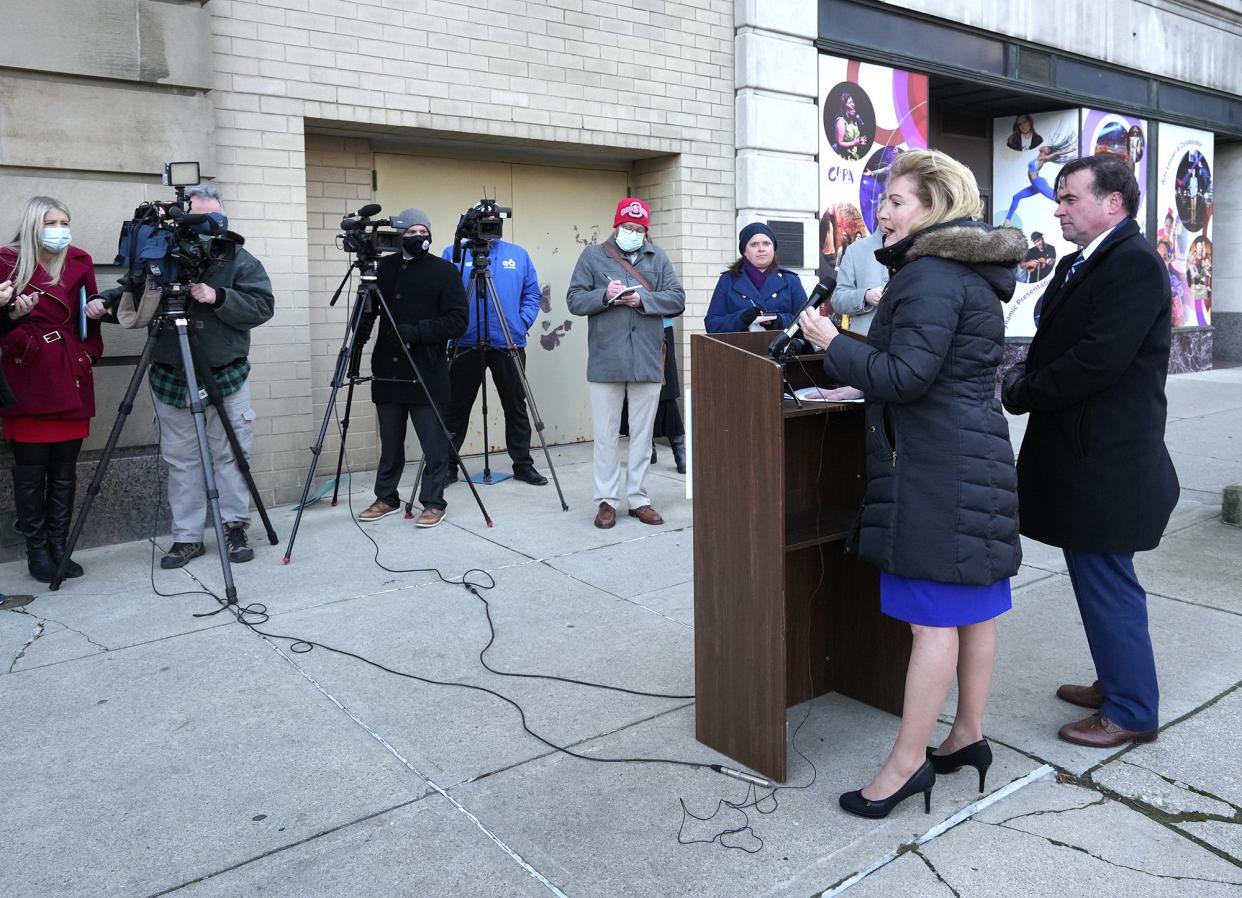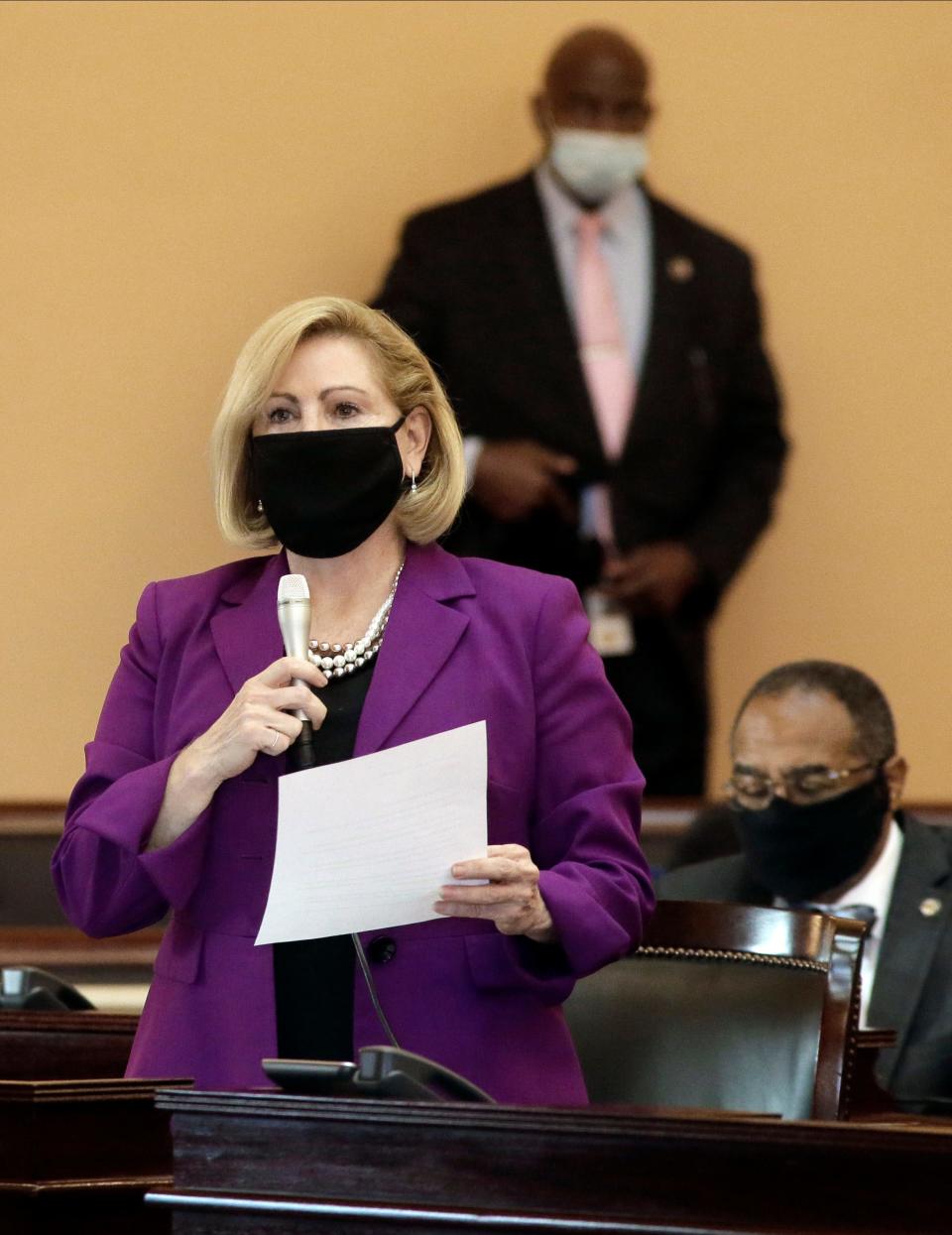Democrats introduce bill to mandate universal Pre-K for all Ohio children

- Oops!Something went wrong.Please try again later.
All Ohio children would be eligible for public preschool if state Sen. Teresa Fedor, D-Toledo, gets her way.

The Democrat, who is also running to be the next lieutenant governor, introduced Senate Bill 318 to mandate universal preschool if Congress passes Build Back Better, a bill that includes billions for childcare and pre-K.
If the federal bill doesn't pass, Fedor's backup plan is a state constitutional amendment.
"Other states have done it. They're successful," Fedor said. "We can replicate it. We can do it if we have the political will."
The cost of pre-K in Ohio
Political will is great, said Greg Lawson, a researcher for the conservative Buckeye Institute. But you also have to consider what mandating preschool would cost―especially in a state that doesn't mandate universal, full-day kindergarten.
"It’s definitively going to be very expensive," Lawson said.
School districts would need to hire qualified teachers, expand bus routes and even build new classrooms to accommodate the additional students.
The Build Back Better plan would cover the costs of preschool for six years. But there's a catch. Ohio wouldn't have to spend its own money at first, but the law would require a 40% state match by year six.
The federal proposal is also far from a guarantee.
Fedor didn't have an estimate for Ohio funding its own universal preschool program, but Dayton's Preschool Promise program, which is funded by a city income tax, cost about $7.5 million in the fiscal year 2020-2021 and served around 1,800 students.
That works out to about $4,166 per pupil. Ohio averages about 120,000 public school students per grade, which means a similar statewide preschool program could cost $500 million.
"The most critical barrier to increasing access to high-quality Pre-K programming is minimal funding," Columbus City Schools spokesperson Jacqueline Bryant said. "Other resources don’t cover the costs for expansion."
Will it set up Ohio kids for success?
But before Ohio invests those dollars, Lawson said he would want "pretty iron clad evidence that this is going to set children up for success."
Supporters of universal preschool say absolutely.
Former Dayton Mayor Nan Whaley, who is running in the Democratic primary for governor this year, counts Preschool Promise among her "proudest work as mayor."
Ohio Democrats: Should Ohioans have access to universal pre-K? Democrats pitch investment in kids
Since its inception in 2016, kids enrolled in the Dayton program have tested higher on kindergarten readiness exams than their peers, according to the non-profit's data.
The numbers also show an increase in readiness among Black children (57% to 41%).
"Not only has this program helped Dayton’s kids come to kindergarten more prepared," Whaley said. "It’s spurred growth among Black and women-owned small businesses in Dayton and helped families to afford the increasingly high cost of childcare."
Whaley is running for the Democratic nomination for governor against former Cincinnati Mayor John Cranley, who is running with Fedor.
State-funded pre-K programs have more than doubled in size since the early 2000s, according to Rutgers University's National For Early Education Research.
Their data shows a statistically significant difference in language and literacy skills among the kids who attended pre-K.
But not all studies come to the same conclusion.
Researchers at Vanderbilt University analyzed Tennessee’s pre-K program and released findings in 2022 that showed those students doing worse on state tests in grades three through six.
"Whether it’s good to get somebody into something always depends on the alternatives," said Fredrick Hess, the Education Policy Studies director at the American Enterprise Institute (a conservative think tank).
Some parents prefer to stay home and prepare their kids for kindergarten. Others want to use community cooperatives or faith-based services from their local church, synagogue or mosque.
"These can be better than a pretty decent pre-K experience...," Hess said. "I believe in options, so families can find what suits them. But that’s different from what we mean by universal pre-K."
The Biden White House pointed to the economic benefits of universal pre-K when it rolled out Build Back Better, saying the change could save the average family about $13,000.
But Hess said that again depends on what we mean by universal access. A program that follows the academic calendar and lets out at 3 p.m. might actually be worse for parents than a year-round preschool that lets them pick up their children after 5 p.m.
"There’s a difference between taking a kid a few blocks over and putting your four-year-old on a bus," he said.
Universal pre-K's chances in Ohio
If President Joe Biden's plan became law, it would be up to Ohio's governor to decide whether to accept the federal funds.
SB 318 would mandate that he or she do so, and that's why Fedor wants it to pass.
Nineteen states rejected the Medicaid expansion offered under the Affordable Care Act. Former Ohio Gov. John Kasich took those dollars, but there's no guarantee another governor would do the same.
Republican Gov. Mike DeWine's spokesman declined to comment about whether the governor would accept money from Build Back Better.
But he has made early childhood education a focus in his administration. DeWine fought Senate President Matt Huffman, R-Lima, to keep ratings for Ohio's childcare facilities in the last budget. And he increased the income cap for state assistance.
Ohio child care: Republican lawmakers want to rewrite how Ohio grades child care providers
Still, it took six years of negotiations before lawmakers rewrote the funding formula for K-12 schools. Getting the state's Republican majority on board for pre-K could be a heavy lift.
"I’m not afraid of funding because we’ve got lots of money," Fedor said. "It's where you put it."
Anna Staver is a reporter for the USA TODAY Network Ohio Bureau, which serves the Columbus Dispatch, Cincinnati Enquirer, Akron Beacon Journal and 18 other affiliated news organizations across Ohio.
Get more political analysis by listening to the Ohio Politics Explained podcast
This article originally appeared on The Columbus Dispatch: Democrats push to mandate universal Pre-K for Ohio

